Dexter Gordon on Tenor at the Jazznote
 (43 seconds; 169 KB)
(43 seconds; 169 KB)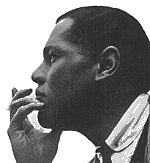
 (43 seconds; 169 KB)
(43 seconds; 169 KB)Few could hold a candle to Dexter Gordon as far as longevity. He was around for some of bop's first session. Charlie Parker even did a variation on his "Dexterity" for one of his first sessions in the late '40's. His early sax battle classic, "The Hunt", was prominently featured as a galvanizing anthem in Jack Kerouac's beat classic 'On The Road.' He was even nominated for an Acadamy Award late in life.
Perhaps the primary figure in transfering the characteristics of bop to the tenor saxophone, Dexter actually was a West Coast native, born in Los Angeles, California (2/27/23). The son of a doctor whose patients included Duke Ellington and Lionel Hampton, Dexter started out on clarinet, moved on to alto, and turned to the tenor in 1940. In December of that year he started a three-year stint with Lionel Hampton, followed by gigs with Lee Young, Jessie Price, and six months with Louis Armstrong in '44.
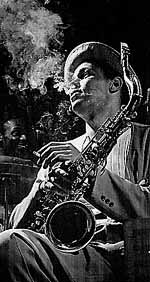 It was during a year-and-a-half stint with Billy Eckstine's band that Dexter recorded his first solo: 'Blowing The Blues Away.' Shortly after, on February 9, 1945, he appeared on one of the first true Bop sessions, performing with Dizzy Gillespie on 'Blue'n Boogie.' From there he went on to the Spotlite in New York City with fellow Eckstinian alumni Charlie Parker before returning to the West Coast in 1946 (including a two month stay in Honolulu with Cee Pee Johnson).
It was during a year-and-a-half stint with Billy Eckstine's band that Dexter recorded his first solo: 'Blowing The Blues Away.' Shortly after, on February 9, 1945, he appeared on one of the first true Bop sessions, performing with Dizzy Gillespie on 'Blue'n Boogie.' From there he went on to the Spotlite in New York City with fellow Eckstinian alumni Charlie Parker before returning to the West Coast in 1946 (including a two month stay in Honolulu with Cee Pee Johnson).
Late 1947 found Dexter on 52nd Street, NYC--the place of legends. There he played in a number of small units before returning to California for what would be his longest absence. Over the course of twelve years Dexter descended into a West Coast limbo. Around 1952 Gordon spent some time in prison for narcotics, but otherwise spent an uneventful tenure in West Coast limbo jamming occasionally with fellow West Coasters Wardell Gray and Sonny Clark, yet recording little other than a couple of sessions for the Bethleham label in 1955.
1960 would be Dexter Gordon's renascence. That year he wrote the music for and performed the west coast edition of Jack Gelber's The Connection (originally composed by Freddy Redd and Jackie McLean). In May of the following year he traveled to New York, acting on an invitation from Alfred Lion. There, in the space of one week, he recorded two albums for Blue Note. In all, Gordon would record six albums for Blue Note between 1960-65--all of which are recommended.
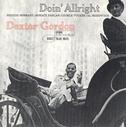
 On Doin' Allright (BN 4077), recorded May 6, 1961, Dexter is supported by the new trumpet star Freddie Hubbard and the close-knit rhythm section of Horace Parlan (p), George Tucker (b), and Al Harewood (d) familiar from previous Blue Note albums with Stanley Turrentine (Look Out BN 4039), as well as under Parlan's leadership (Us Three BN 4037, Speakin My Piece with Stanley and Tommy Turrentine BN 4043, Headin South BN 4062 and Up&Down with Booker Ervin and Grant Green BN 4082). The album marks a strong comeback and is reissued on CD with an alternate track. Of particular interest is the blues, "Society Red", which would feature prominently in the soundtrack to Gordon's last comeback in 'Round Midnight.
On Doin' Allright (BN 4077), recorded May 6, 1961, Dexter is supported by the new trumpet star Freddie Hubbard and the close-knit rhythm section of Horace Parlan (p), George Tucker (b), and Al Harewood (d) familiar from previous Blue Note albums with Stanley Turrentine (Look Out BN 4039), as well as under Parlan's leadership (Us Three BN 4037, Speakin My Piece with Stanley and Tommy Turrentine BN 4043, Headin South BN 4062 and Up&Down with Booker Ervin and Grant Green BN 4082). The album marks a strong comeback and is reissued on CD with an alternate track. Of particular interest is the blues, "Society Red", which would feature prominently in the soundtrack to Gordon's last comeback in 'Round Midnight.
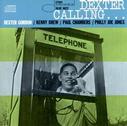
 On Dexter Calling (BN 4083), recorded just three days later, the tenor is accompanied by Coltrane's 'Blue Trane' rhythm section of Kenny Drew (p), Paul Chambers (b) and Philly Joe Jones (d). The CD reissue adds a previously unreleased version of "Landslide". For all intents and purposes Dexter was back on the scene.
On Dexter Calling (BN 4083), recorded just three days later, the tenor is accompanied by Coltrane's 'Blue Trane' rhythm section of Kenny Drew (p), Paul Chambers (b) and Philly Joe Jones (d). The CD reissue adds a previously unreleased version of "Landslide". For all intents and purposes Dexter was back on the scene.


 Following yet another return to California, Dexter made New York his base of operations throughout 1962 while touring the East Coast extensively and recording the pivotal album Go (BN 4112).
Following yet another return to California, Dexter made New York his base of operations throughout 1962 while touring the East Coast extensively and recording the pivotal album Go (BN 4112).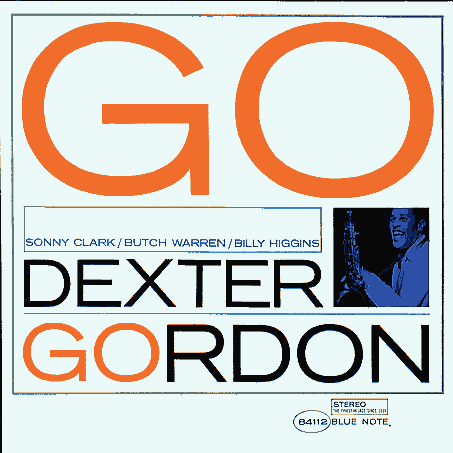 His dormancy well behind him he was now back in the fold of the elite tenormen.
His dormancy well behind him he was now back in the fold of the elite tenormen.
Click here to hear the intro to Gordon's 'Cheese Cake.' (43 seconds; 169 KB)
to hear the intro to Gordon's 'Cheese Cake.' (43 seconds; 169 KB)
For Go Gordon is teamed with the last great Blue Note house rhythm section: fellow West Coaster Sonny Clark on piano, bassist Butch Warren, and the versatility and lyricism of Billy Higgins on drums. This lineup can also be heard on Dexter's A Swingin Affair (BN 4133).
On Go we hear what differentiates Gordon from fellow tenors like Coltrane and Rollins. Although leaning closer to Rollins' use of sparsity as well as the beeps and honks, the 'accidentals', that display a mirth utterly lacking in Coltrane, Dexter departs from the Rollins school in his greater fluidity and integration with the rhythm section. (Recall that Rollins often preferred to perform in a pianoless trio, essentially soloing over bass and percussion.)
The minor-key gem 'Cheese Cake' is an exercise in tight phrasing and seemless 'sentence structure' and has almost a tango romp to it. This is followed by the ballad, 'I Guess I'll Hang My Tears out to dry', which despite Ira Gatler's liner-note comments to the contrary has a Hawkin's-like tenderness of execution, helped along with Higgins' delicate brushwork and a beautiful solo by Clark. 'Second Balcony Jump' is a straightahead modernization of how he had performed it while working with Billy Eckstine in the forties. 'Love For Sale' is nearly samba in drum-work and phrasing but all "boss" horn a'la Gene Ammons. The tenderness and simplicity of 'Where Are You' is followed by the masterpiece of playfulness, 'Three O'Clock In The Morning' in which he quotes 'Take Me Out to the Ball Game' and 'Five O'Clock Whistle.'
An interesting variation on this line-up and recorded around the same time as Go is to be found on Herbie Hancock's debut as leader, Takin' Off (BN 4109). Here, the young pianist is supported by Freddie Hubbard, Warren and Higgins, and Dexter himself in one of his only supporting roles on album since the forties.
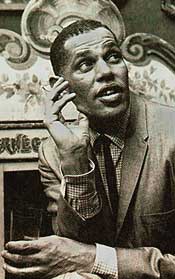
 Not one to call any one place home for long, Dexter was a Paris resident by the Spring of '63. There he teamed up with fellow expatriates Kenny Clarke (ds), Bud Powell (p), and French native Pierre Michelot (b), who had already been performing together in Paris as The Three Bosses for the past four years. This session for Blue Note, appropriately titled Our Man In Paris (Blue Note 4146), was supposed to feature Kenny Drew on piano and be comprised of originals. Instead, the album is a fantastic collection of revamped standards as Bud Powell refused to play any new compositions. The updated CD includes the session-opener 'Our Love Is Here to Stay' along with a trio version of 'Like Someone In Love' where Powell shines especially bright--neither of which was included on the original LP release.
Not one to call any one place home for long, Dexter was a Paris resident by the Spring of '63. There he teamed up with fellow expatriates Kenny Clarke (ds), Bud Powell (p), and French native Pierre Michelot (b), who had already been performing together in Paris as The Three Bosses for the past four years. This session for Blue Note, appropriately titled Our Man In Paris (Blue Note 4146), was supposed to feature Kenny Drew on piano and be comprised of originals. Instead, the album is a fantastic collection of revamped standards as Bud Powell refused to play any new compositions. The updated CD includes the session-opener 'Our Love Is Here to Stay' along with a trio version of 'Like Someone In Love' where Powell shines especially bright--neither of which was included on the original LP release.
Further Paris sessions would include One Flight Up (BN 4176) with Donald Byrd (tpt), Kenny Drew (who could make it this time), Niels-Henning Orsted (b) and Art Taylor (d); and Gettin Around (BN 4204) with Bobby Hutcherson on vibes, Barry Harris (p), Bob Cranshaw (b) and Billy Higgins (d).
Whilst most surviving bop legends had descended into the fields of fusion, funk, or the avant-garde by the onset of the seventies, Gordon still blazed ahead in his typical fashion, sticking to the tried-and-true small combos that had made him legendary. Moreover, he was more prolific in the studio than ever, recording steadily for such labels as SteepleChase and Black Lion. In 1975 he recorded seven albums for SteepleChase alone, considered to be some of his finest. Such titles as Bouncin' with Dex, Something Different, More than You Know, Lullaby for a Monster and Biting the Apple proved Gordon to be undiminished.
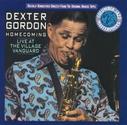 Having descended again into obscurity despite his prolific output during his self-imposed exile in Europe, it was somewhat surprising that his return in 1976 was so celebrated. A national tour commanded long lines for each performance and Columbia issued a very fine double album capturing one of those shows. At just under two hours, the double-CD Homecoming: Live at the Village Vanguard is nearly a half hour longer than the original LP, with extended versions of such classics as "Round Midnight" and "Body and Soul" at well over ten minutes, and features Woody Shaw on trumpet, Ronnie Matthews (p), Stafford James (b) and Louis Hayes on drums.
Having descended again into obscurity despite his prolific output during his self-imposed exile in Europe, it was somewhat surprising that his return in 1976 was so celebrated. A national tour commanded long lines for each performance and Columbia issued a very fine double album capturing one of those shows. At just under two hours, the double-CD Homecoming: Live at the Village Vanguard is nearly a half hour longer than the original LP, with extended versions of such classics as "Round Midnight" and "Body and Soul" at well over ten minutes, and features Woody Shaw on trumpet, Ronnie Matthews (p), Stafford James (b) and Louis Hayes on drums.
By the '80's Gordon's health had deteriorated considerably, and consequently his playing as well. No longer to maintain the recording and touring schedule that kept him going strong during the '70's, Gordon slid into inactivity. However, he wasn't through yet.
 In 1986 Dexter returned to the West Coast yet again. Resurfacing in Hollywood to take a lead role in 'Round Midnight, playing--what else?--a one-time legendary tenor saxophonist playing small Parisian clubs in the '50's and being hounded by an enthusiastic young fan. He was even nominated for both an Acadamy Award and a Golden Globe for a portrayal that was hauntingly realistic. This film is also a must for jazz buffs as it has cameos by Herbie Hancock, Bobby Hutcherson, and Wayne Shorter, not to mention a brilliant soundtrack for which Herbie Hancock got an Oscar.
In 1986 Dexter returned to the West Coast yet again. Resurfacing in Hollywood to take a lead role in 'Round Midnight, playing--what else?--a one-time legendary tenor saxophonist playing small Parisian clubs in the '50's and being hounded by an enthusiastic young fan. He was even nominated for both an Acadamy Award and a Golden Globe for a portrayal that was hauntingly realistic. This film is also a must for jazz buffs as it has cameos by Herbie Hancock, Bobby Hutcherson, and Wayne Shorter, not to mention a brilliant soundtrack for which Herbie Hancock got an Oscar.
Gordon can also be seen tickling the ivory in a mental hospital in the Robin Williams-Robert De Niro film, Awakenings, released nearly a year ater his death on April 25, 1990.

 Clocking in at just under 70 minutes a disc the 6-CD set, Dexter Gordon's Complete Blue Note Sixties Sessions is a good buy. Covering his most celebrated recording period in chronological order with a number of extra tracks and alternate takes this package is a must for core Gordon and bop fans.
Clocking in at just under 70 minutes a disc the 6-CD set, Dexter Gordon's Complete Blue Note Sixties Sessions is a good buy. Covering his most celebrated recording period in chronological order with a number of extra tracks and alternate takes this package is a must for core Gordon and bop fans.